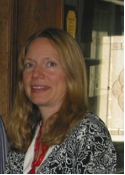The LIGHT Program
Helping People with Developmental Disabilities Process Grief
by Heidi Champagne
The man sat quietly toward the back of the room. He was dressed neatly in khaki pants and a button down shirt, and wore an expression that looked at once mournful and anticipatory. He moved to the music during the service, but few guessed that he understood the reason for the gathering.
One by one, the man's peers stood and moved toward the front of the room. Some spoke a few words while others sang a song. The man sat respectfully, but the look on his face began to transform. Concerned staff wondered if he was becoming uncomfortable and agitated.
When he stood and walked to the front of the room, there was a collective gasp. Then there was nothing but silent admiration. The man looked out at those assembled and folded his hands into a "prayer" position. As he bowed his head, this man, who had no ability to verbalize, offered a stream of vocalization that was without a doubt his very heartfelt prayer.
Prior to spring of 2004, this situation might have been unheard of. We worked within a system where people with developmental disabilities were often sheltered, and seldom played a role in their own grieving.
There was no program or agency in place that addressed the unique grieving process of people with developmental disabilities. There were no supports to help them to understand the loss. There were no services to provide free or low cost memorial tributes for these most vulnerable people.
There are two ways to respond when you find a need for a service that doesn't exist: you get by without it, or you create the service.
In 2004, while working as a service coordinator for the Department of Mental Retardation, I experienced the deaths of several people on my caseload. It became apparent that in many cases, the people I worked with, (adults with developmental disabilities, who most often lived in group homes or other supported living situations) had no surviving families and few financial resources for a memorial service.
Some people had a network of staff around them who had become "like family," having known them for 5, 10 and sometimes even 20 years. Some had "house mates" or friends who attended the same program who had known them for years.
LIGHT was born. The letters in the name stand for Lending Individuality, Guidance and Hope To end of life transitions.
Comprised of a part-time director and a staff of big-hearted volunteers, LIGHT responds to pleas for very specialized help. The call usually comes from a shocked staff person or the director of an agency, and goes something like: "I'm not sure what we need, but there's been a tragedy. Can you come?"
Since its inception, LIGHT has sent more than 41 volunteer teams to agencies in which a staff or client has died, has planned and provided 46 memorial services, and has provided more than 30 six-week peer driven support groups for those with developmental disabilities who are grieving.
LIGHT is an independently funded "program" of the Arc of Cape Cod, while it awaits its own independent 501c3 status. Because we receive no funding from the Arc or the state, we rely upon fundraising, grants and donations in order to continue our services.
Sometimes our services are an immediate response, (within 24 hours). Other times, the grief has been "untouched" for years, as in the case of a woman who mourned the death of a brother who died 21 years before. When her sister was getting married and leaving home, the "loss" of her sister brought up her grief over her brother's death.
There is no statute of limitations on grieving, even if society tries to impose one. Grief is as poignant, powerful and transformative for people with developmental disabilities as it is for the non-disabled population. The differences come in the processing time, communication style and delivery of services.
There is no end to the creativity of volunteers who have adapted activities for people with visual and hearing deficits and autism in addition to cognitive disabilities.
LIGHT's work tends to be "hands on" versus "talk oriented". We utilize relaxation techniques, creative movement, music, singing, dancing, art, gardening and the creation of memory projects in helping those we serve to express their grief.
LIGHT's services might be best summed up in the testimonial of one of our participants, who after attending the support group stated: "...No one even told me my mom was sick. I knew there was something wrong, but I didn't understand what. Then she was dying, and no one told me. They were afraid I'd be upset. Of course I was upset. I'm so glad that now I can talk about it."

If you are interested in learning more about LIGHT visit us online at www.lightprogram.org call Heidi Champagne at (508)243-3111 or email us at lightprogram@comcast.net

Heidi Champagne is the founder and director of the LIGHT program.
She has worked in programs serving the developmentally disabled for 16 years, most recently for the MA Department of Developmental Services.
Using her experience with those going through the grieving process, Heidi has lovingly created this specialized program to assist people with developmental disabilities through the grief process in a creative, supportive, meaningful and team focused manner.
Heidi holds an Associates Degree in Human Services, and is pursuing a Bachelors Degree in Pastoral Thanatology. Heidi is also a Reiki Master, and brings her healing skills and compassion to her work with LIGHT
 |
